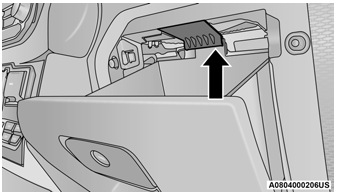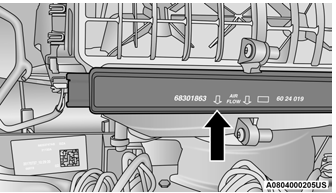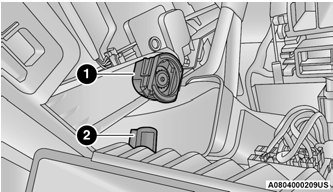Jeep Wrangler: VEHICLE MAINTENANCE / Air Conditioner Maintenance
For best possible performance, your air conditioner should be checked and serviced by an authorized dealer at the start of each warm season. This service should include cleaning of the condenser fins and a performance test. Drive belt tension should also be checked at this time.
WARNING!
- Use only refrigerants and compressor lubricants approved by the manufacturer for your air conditioning system. Some unapproved refrigerants are flammable and can explode, injuring you. Other unapproved refrigerants or lubricants can cause the system to fail, requiring costly repairs. Refer to Warranty Information Book, located in your owner’s information kit, for further warranty information.
- The air conditioning system contains refrigerant under high pressure. To avoid risk of personal injury or damage to the system, adding refrigerant or any repair requiring lines to be disconnected should be done by an experienced technician.
CAUTION!
Do not use chemical flushes in your air conditioning system as the chemicals can damage your air conditioning components. Such damage is not covered by the New Vehicle Limited Warranty.
Refrigerant Recovery And Recycling — R–1234yf
R–1234yf Air Conditioning Refrigerant is a hydrofluoroolefin (HFO) that is endorsed by the Environmental Protection Agency and is an ozone-friendly substance with a low global-warming potential. The manufacturer recommends that air conditioning service be performed by an authorized dealer using recovery and recycling equipment.
NOTE:
Use only the manufacturer approved A/C system PAG compressor oil, and refrigerants.
Cabin Air Filter
WARNING!
Do not remove the cabin air filter while the vehicle is running, or while the ignition is in the ACC or ON/RUN mode. With the cabin air filter removed and the blower operating, the blower can contact hands and may propel dirt and debris into your eyes, resulting in personal injury.
The cabin air filter is located in the fresh air inlet behind the glove compartment. Perform the following procedure to replace the filter:
- Open the glove compartment and remove all contents.
- Push up on the glove compartment travel
stop and lower the door.

Glove Compartment Travel Stop
- Pivot the glove compartment downward.
- Disengage the two retaining tabs that
secure the air filter access door to the HVAC
housing.

Air Filter Retaining Tabs
- Remove the air filter from the HVAC air inlet
housing. Pull the filter elements out
pinching them to the right for clearance.

Air Filter
- Install the cabin air filter with the air filter
position indicators pointing in the same
direction as removal.
CAUTION!
The cabin air filter is identified with an arrow to indicate airflow direction through the filter. Failure to properly install the filter will result in the need to replace it more often.
- Close cabin air filter access door and secure retaining tabs.
- Rotate the glove compartment door back
into position ensuring you have properly
engaged the travel damper.

Travel Dampener
- Travel Dampener Housing
- Travel Dampener Rod
 Accessory Drive Belt Inspection
Accessory Drive Belt Inspection
WARNING!
Do not attempt to inspect an accessory
drive belt with vehicle running.
When working near the radiator cooling fan,
disconnect the fan motor lead...
 Body Lubrication
Body Lubrication
Locks and all body pivot points, including such
items as seat tracks, door hinge pivot points
and rollers, liftgate, tailgate, decklid, sliding
doors and hood hinges, should be lubricated
periodically with a lithium based grease, such
as Mopar® Spray White Lube to ensure quiet,
easy operation and to protect against rust and
wear...
Other information:
Jeep Wrangler 2018-2026 Owners Manual: Phone Operation
Operation Voice commands can be used to operate the Uconnect Phone and to navigate its menu structure. Voice commands are required after most Uconnect Phone prompts. There are two general methods for how Voice Command works: Say compound commands like “Call John Smith mobile”...
Jeep Wrangler 2018-2026 Owners Manual: Run Flat Tires — If Equipped
Run Flat tires allow you the capability to drive 50 miles (80 km) at 50 mph (80 km/h) after a rapid loss of inflation pressure. This rapid loss of inflation is referred to as the Run Flat mode. A Run Flat mode occurs when the tire inflation pressure is of/or below 14 psi (96 kPa)...
